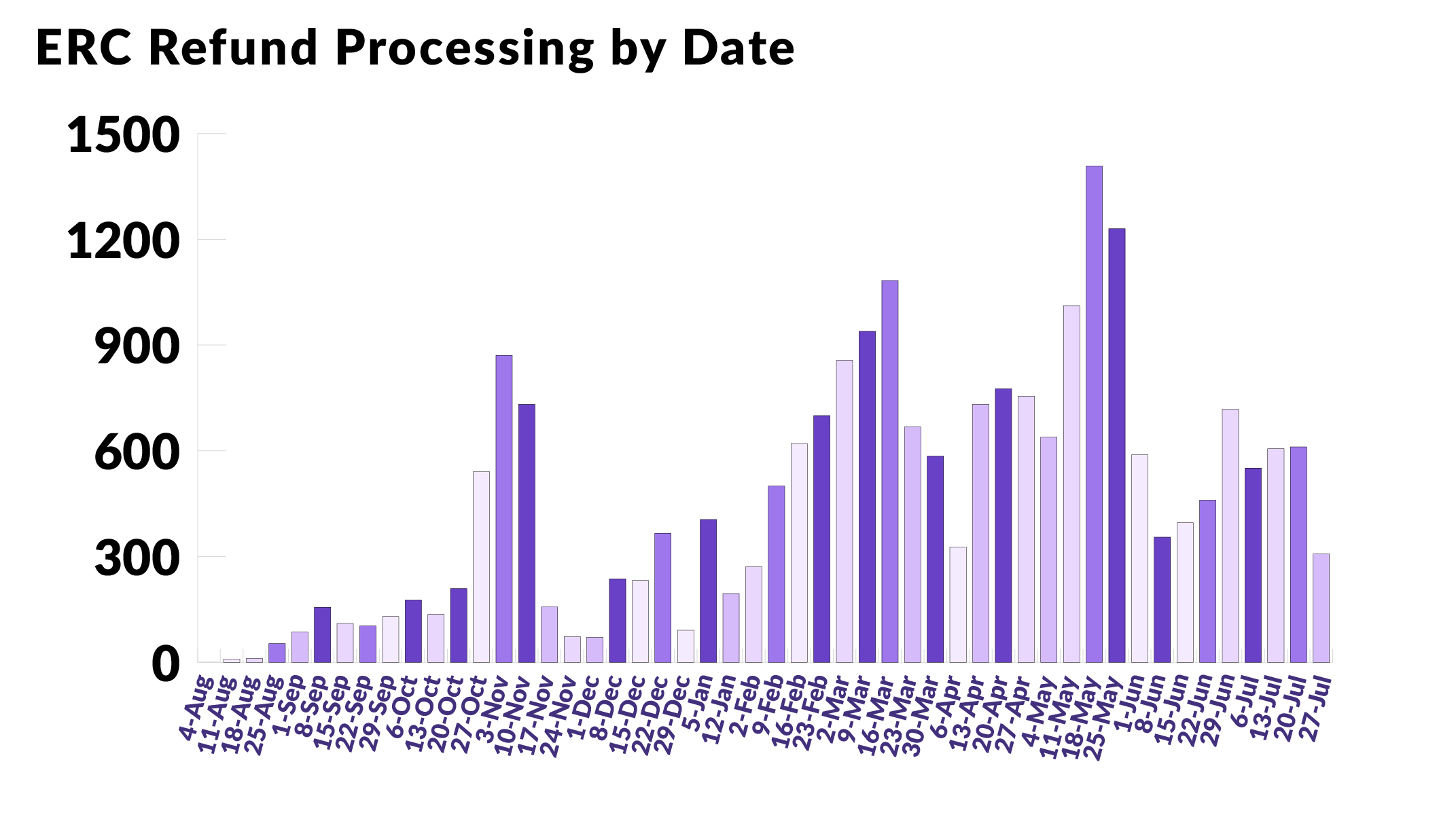
In what feels like a cruel post-OBBBA twist, ERC refund processing took a significant hit this week, dropping to the lowest dollar volume of refunds processed since January 1. To pour salt on the wound, the IRS appears to be turning up the heat on audits, with July shaping up to be the most aggressive month yet for ERC enforcement. Taxpayers waiting for ERC refunds, as well as practitioners who are heavily involved in ERC tax controversy, are left scratching their heads on how the IRS intends to keep its promise of processing all ERC inventory by the end of the calendar year.
Here’s how this past week breaks down:
📉 Refunds processed dipped to 302, down from last week’s 616. A whopping 51% decline and the lowest we’ve seen in many months.
📉 The average refund amount was slashed by more than half, dropping to $72,807 from last week’s $156,317.
📉 Trouble tends to come in threes as the total dollar volume also fell to a staggering $21.95M, a depressing slide from last week’s $93.53M.
Whether it’s seasonal slowdown, backlog fatigue, or just a lull before the next wave, we’ll be watching closely to see if next week brings a bounce or a new bottom.
On the IRS audit front, in the first two weeks of July, we’ve seen 86 quarterly audits. With June topping out at 102 audits, July is on pace to set the all-time monthly high for ERC examination codes. What a brutal week it’s been!
If there’s any silver lining, it’s that we continue to hear about small wins in the PEO ERC world. We’ll provide more updates as we learn more.


1. House GOP Eyes Follow-Up Budget Bill with Deeper Cuts and Policy Fixes - Fresh off passing President Trump’s $3.4 trillion tax and spending package, House Republicans are already shaping a follow-up budget bill aimed at deeper entitlement cuts and tax code corrections. House Budget Chair Jodey Arrington said the new legislation, expected by year’s end, will target additional savings, including $150 billion from Medicare via site-neutral payments. Conservatives are also pushing to cut Medicaid reimbursements for able-bodied adults and penalize states that provide benefits to undocumented immigrants. While some hardliners want to use reconciliation to push broader cuts, Arrington warns against bypassing regular appropriations, citing risks if political control flips. With two more budget cycles before the 2026 midterms, Republicans see this as a key window to extend their fiscal agenda.
2. Trump Administration Defends DOGE Access - The Trump administration’s move to grant the Department of Government Efficiency (DOGE) access to IRS data for a cross-agency database is being challenged by several nonprofits, including the Center for Taxpayer Rights, but the government argues the plaintiffs lack standing. In a July 10 motion to dismiss, the government said there’s no evidence that any individual’s data was improperly shared, and any claimed harm is speculative. The plaintiffs argue the administration aims to build a unified federal database using confidential IRS data, violating the Administrative Procedure Act and taxpayer privacy protections. The government counters that such data sharing is permitted under existing law and that the plaintiffs should seek remedies through statutes like section 7431 or the Privacy Act, which allow only for monetary damages—not injunctive relief. The plaintiffs’ response is due August 1.
Kenny's Conclusions
In a week defined by steep declines and growing uncertainty, the ERC landscape continues to deliver more questions than answers. With refund volume hitting a yearly low and audit activity ramping to historic highs, it’s apparent that the IRS could once again bshifting from payout mode to enforcement. As we enter the second half of the year, taxpayers and advisors alike will be watching closely, not just for signs of a processing rebound, but for any clarity on how the IRS plans to deliver on its year-end clean-up promise amid mounting scrutiny and legislative turbulence.
Signing off!
Kenny Dettman, CPA
Disclaimer: *𝘋𝘢𝘵𝘢 𝘴𝘦𝘵 𝘪𝘴 𝘧𝘳𝘰𝘮 𝘢𝘱𝘱𝘳𝘰𝘹𝘪𝘮𝘢𝘵𝘦𝘭𝘺 13,000 𝘣𝘶𝘴𝘪𝘯𝘦𝘴𝘴𝘦𝘴 𝘵𝘳𝘢𝘤𝘬𝘪𝘯𝘨 𝘌𝘙𝘊*